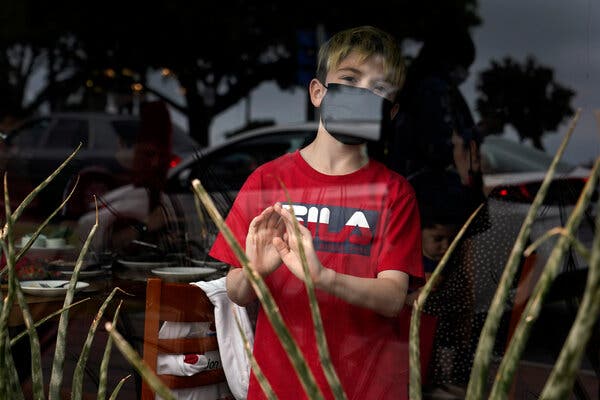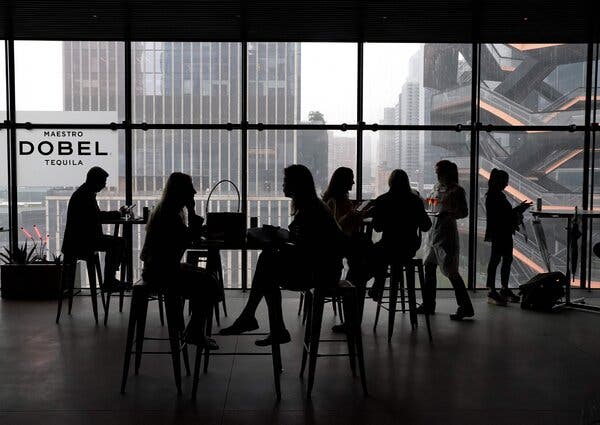723 Epidemiologists on When and How the U.S. Can Fully Return to Normal
Government mandates are lifting, but these experts say the pandemic won’t really end nationally until more people, including children, are vaccinated. In a survey, epidemiologists said the pandemic would not be over in the United States until children were vaccinated. A child looked out the window of a restaurant in Santa Monica, Calif., on Thursday.Marcio Jose Sanchez/Associated PressCovid-19 cases are decreasing in the United States, and masks are no longer required everywhere, but the pandemic is not over — and won’t be until younger children can also be vaccinated, epidemiologists said in a new survey by The New York Times.The true end of the pandemic — when it becomes safer to return to most activities without precautions — will arrive once at least 70 percent of Americans of all ages are vaccinated, they said. Adolescents just began receiving vaccines this week, and those for children younger than 12 are not yet approved.“Children are key to ending the pandemic,” said David Celentano, the chair of epidemiology at Johns Hopkins University and one of the 723 epidemiologists who participated in the survey this month.They are optimistic this will happen, even if not as quickly as many Americans hope. In five years, they expect Covid-19 will be more like the flu, circulating at a lower rate and with some deaths every year — but no longer a public health crisis necessitating lockdowns.“It feels like there is a light at the end of the tunnel,” said Gretchen Bandoli, an assistant professor of pediatrics at the University of California, San Diego. “We have the tools we need to get there, and it feels within reach.”Yet it’s still unclear if the United States can reach that level of vaccination. And even as cases decline domestically, the global toll of Covid-19 is rising in parts of the world that have not had the same access to vaccines.Already, Americans are beginning to be able to do things they had been advised to avoid for the last 14 months. The Biden administration said Thursday that fully vaccinated people no longer needed to wear masks in most places. (The survey was conducted over the last two weeks, before the mask announcement.)In the survey, about 85 percent of respondents said it was likely that Americans would be able to safely gather for Fourth of July barbecues this summer, as President Biden has called for. A slightly higher share said it was likely that schools would be able to be fully open in the fall, and that families would be able to safely gather indoors for the winter holidays.Still, the campaign to vaccinate more Americans cannot let up until children are protected, they said. Half of respondents said at least 80 percent of Americans, including children, would need to be vaccinated before it would be safe to do most activities without precautions. Though children are less likely than adults to develop severe cases of Covid-19, the scientists said their immunity was important because they could be hosts for the virus and a way for it to continue to circulate or develop new variants.“Children cannot be left out of the equation as we reopen,” said Corinne McDaniels-Davidson, the director of the San Diego State University Institute for Public Health. “The ideas that they cannot transmit Covid or are immune from disease are pervasive among the lay public. We need education here.”In assessing when the acute phase of the Covid pandemic could be considered over, they said vaccinations were more relevant than other metrics like new cases, hospitalizations or deaths (because an effective vaccination campaign would lower those rates, they said).The country is not there yet. Nationwide, 36 percent of Americans are fully vaccinated, and the pace of vaccinations has slowed.Of the 723 epidemiologists who participated in the survey, 35 percent work for governments. The rest are mostly academics. The questionnaire was distributed to two major professional groups, the Society for Epidemiologic Research and the Council of State and Territorial Epidemiologists, as well as some individual scientists.Andrew Lai, 12, received his vaccine in Los Angeles on Thursday, the first day that Covid vaccines were available for adolescents. Children under 12 are still not eligible.Frederic J. Brown/Agence France-Presse — Getty ImagesThe decision to reopen states is based on many factors, including the decisions of governors and the considerations of business owners, and may not align with the recommendations of the survey respondents. Even before the C.D.C. announcement, about half of states had already dropped mask requirements or lifted capacity limits for large group settings, and more may follow suit in the coming days. Also, many public health professionals fear that such a high threshold of vaccinations — enough to reach so-called herd immunity — may not be achieved.But the survey responses from the group of scientists suggested that full reopening without high vaccination rates may be associated with continuing outbreaks of the virus, in the United States and worldwide.“Lack of ability to effectively vaccinate globally may continue to haunt us,” said Cynthia Morris, an epidemiologist at the Oregon Health & Science University.Americans’ reluctance to accept vaccines is the biggest threat to ending the pandemic, the scientists said. They were also concerned about the rise of new virus variants or a too-quick return of people’s prepandemic routines. A substantial share — 22 percent — worried that the politicization of public health could hamper the fight against the virus.“The more people refuse vaccinations, the longer Covid will hang around,” said Ethan S. Walker, an epidemiologist at the University of Montana.Scott Bartell, an epidemiologist at the University of California, Irvine, said, “I’m hopeful that someday Covid-19 will be more like measles, mostly eliminated but not eradicated, with sporadic outbreaks and clusters primarily among those not immunized.”Even if the spread of Covid-19 decreases enough to allow a return of most activities, there are some aspects of pandemic life that epidemiologists say will persist much longer.In particular, they say that masks are a norm that should continue, even if that view puts them at odds with the new C.D.C. guidance. More than 80 percent of them say people should continue to wear masks when indoors with strangers for at least another year, and outdoors in crowds.They would like to see the continuation of what they consider the rare silver linings that came from the last year. They hoped that people would have to travel for work less often. They wanted expanded grocery delivery and takeout restaurant options to continue, as well as tele-health visits for routine medical appointments. Many buildings have improved their ventilation, upgrades that will pay off when it comes to other respiratory diseases.They also hoped people would keep habits that make them healthier in general: avoiding things like going to work when sick, shaking hands and even blowing out birthday candles.“I cannot believe that we used to celebrate birthdays by eating a cake that someone has blown all over,” said Brian Labus, an epidemiologist at the University of Nevada, Las Vegas.In the past year, epidemiologists have found themselves suddenly in the spotlight. One of their challenges, they said, has been communicating to the public a complicated truth of their profession — that there are rarely clear right or wrong answers when it comes to risks and benefits.“We as epidemiologists are constantly dealing with uncertainty, and it’s pretty familiar to us,” said Kevin Martinez-Folgar, an epidemiology Ph.D. student at Drexel University. “We need to create better ways to communicate this uncertainty to the public to avoid all the misinformation problems that we currently have.”Most important, they said, they wished they had done a better job of communicating the fact that science evolves, and that by definition, health advice will change as scientists learn new things.Asked what public health practitioners should have done differently during the pandemic, David Abramson of N.Y.U.’s School of Global Public Health said he wished they had “reinforced how much science changes daily, and with it the recommendations for protective actions.”
Read more →

